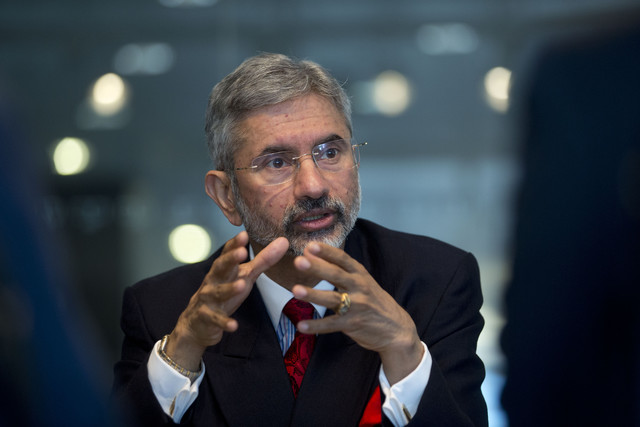Jaishankar in Pakistan to Determine Future of Peace Process
Indian FS S Jaishankar

NEW DELHI: Indian Foreign Secretary, S. Jaishankar, arrived in Islamabad on Tuesday on a two-day visit to Pakistan, as part of the “Saarc yatra” announced by Indian Prime Minister Narendra Modi a few weeks ago.
In response to a question Jaishankar said in Islamabad: “I am glad to be here as part of the Prime Minister’s initiative of a SAARC Yatra. I conveyed the expectations of our leadership on SAARC and their determination to forge a cooperative relationship with all our neighbours.
We discussed ideas and initiatives to take SAARC forward. Pakistan will be the next SAARC Chair and India would like to work with Pakistan to help SAARC achieve its potential.
Naturally, my visit provided an opportunity to discuss our bilateral relations. We engaged on each other’s concerns and interests in an open manner. We agreed to work together to find common ground and narrow differences.
I reiterated our known concerns on cross border terrorism, including on the Mumbai case.
We agreed that ensuring peace and tranquillity on the border was vital.
Our talks were held in a constructive and positive atmosphere.”
The visit, ostensibly to take up South Asian regional cooperation, basically kickstarts a process to hold talks to resume the India-Pakistan dialogue. A slew of meetings have been scheduled with Jaishankar starting the process with discussions with his Pakistani counterpart Aizaz Chaudhry.
The Indian Foreign Secretary, handpicked by Prime Minister Narendra Modi, is seen to enjoy his confidence. Jaishankar who interrupted the full term of former FS Sujatha Singh in office, is currently acting as a foreign policy advisor to the PM with the role of National Security Advisor Ajit Doval being limited to some extent as a result. Sources had indicated earlier that PM Modi was keen to bring in Jaishankar into the PMO but given the hierarchical protocol it was finally decided that it would be less ‘invasive’ to bring him into the Foreign Office with a role larger and perhaps more intense,than that of a foreign secretary.
The official reason for the trip, however, is centred on promoting regional connectivity and trade -- areas that fall within the Saarc ambit.But it is clear to both Islamabad and New Delhi that Jaishankar’s inputs will go a long way in determining the future, as well as the nature, of the peace process between the two neighbours.
Jaishankar is expected to meet Pakistani Prime Minister Nawaz Sharif. Meetings with the Adviser on Foreign Affairs and National Security Sartaj Aziz and Special Assistant to the Pakistani Prime Minister Tariq Fatimi, have also been arranged.
The FS was earlier in Bhutan and Bangladesh, with Islamabad being the third stop on the “Saarc yatra” that began on Sunday. From Pakistan, the Indian delegation will move to Kabul on Wednesday.
However, Islamabad is the most significant stop at this “yatra” as India had cancelled secretary-level talks -- that had been agreed to during Sharif’s visit for PM Modi’s inauguration ceremony -- over Pakistan’s decision to meet Kashmiri separatist leaders in August last year. Speaking at the United Nations last month, Sharif said that India’s decision to cancel the talks had resulted in a “missed opportunity.” Modi, speaking at the UN the next day, responded saying that India was not opposed to talks, but would not participate “in the shadow of terror” and that it was upto Pakistan to “create a conducive atmosphere for talks.”
Further, tensions between the two countries have been high as border skirmishes across the Line of Control that began in late 2014, continue in 2015, with the latest ceasefire violation coming after a week long lull. The firing prompted Pakistan penning a letter to UN Secretary General Ban Ki Moon that invoked the UN to implement resolutions for a plebiscite in Kashmir. The letter marked a major reversal of Pakistan’s position for over a decade, sending bilateral relations between the two countries plummeting.
However, the first sign that the situation was changing came when Pakistan’s former National Security Adviser Major-General (Retd.) Mahmud Durrani met with NSA Ajit Doval and Foreign Secretary S. Jaishankar earlier this month. The Citizen had the reported that the meeting could be an attempt at resuming back channel diplomacy. Although the MEA spokesperson dismissed a question in regard to whether this could pave the way for the resumption of an India-Pakistan dialogue, General Durrani was quoted by The Hindu saying that his impression is that Prime Minister Narendra Modi would “like to move forward” on the dialogue, but would rather not pick up the old format of the composite dialogue process. “Mr. Modi is a different man with a different mind and a different thinking from the previous Prime Minister,” The Hindu quoted General Durrani as saying. “I think he will probably engage with Pakistan, but he would like to do that in his own way.”
In fact, analysts believe that the “Saarc yatra” -- announced by PM Modi when he called Saarc leaders to wish them good luck for the upcoming cricket World Cup -- was a clever diplomatic ploy to kickstart a dialogue process with Pakistan. Having suspended talks in August, the Saarc yatra provided the diplomatic rationale for the FS to visit Islamabad, without India having to retract from its position that it will not tolerate Islamabad drawing Kashmir into the fray.



